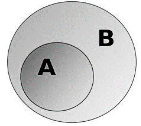Set theory is a subfield of mathematics in which we study the characteristics of various sets and the sets themselves. A collection of different things is what we mean when we talk about a set. The elements of a specific set are the things that make up that set. The study of such sets, as well as the relation that relates the sets to the components they include, is known as set theory. Sir Georg Ferdinand Ludwig Philipp Cantor, a German mathematician, is credited with being the first person to develop the concept of set theory. The development of set theory followed a path very distinct from that of the majority of other subfields of mathematics over its entire history. It was devised so that people may have conversations about groups of things that together stand for a certain category. The study of sets has shown to be an exceptionally useful tool in defining a variety of the most difficult and crucial mathematical structures.
Sets are just a collection of objects that have been arranged in a specific order. Sets can be expressed in two ways: as a roster or as a set builder. The elements of a set are the objects that make up the entire set. These items can be joined together to make a subset of the whole set.
Ex – if a’ is a member of set A, it is written as:
a ∈ A , here ∈ means belongs to
If we see another side then if ‘b’ is not an member of A, we represent it as
b ∉ A, here ∉ means doesn’t belong to
Subset
The word ‘subset’ can be identified with the words like branch, key, etc. Because the common part i.e. ‘sub’ is a prefix whose applicable meaning here is forming a part from a whole. That is what we exactly do to a set to get its subsets.
When all of the factors of set A are also elements of set B, that set is referred to as a subset of set B.also If any element of set A is represented by a, then
a ∈ A and a ∈ B, A ⊂ B( ‘⊂’ reads as ‘subset of’ )
If we take Converse still , A ⊂ B and a ∈ A, also a ∈ B.
Set A is said to be a subset of set B if all of its elements are contained in another set B. We say in this script
A is a subset of B (or)
B is a superset of A
- Every set is a Subset of itself, i.e. A ⊂ A
- since the empty or null or void set φ has no elements, thus , φ is a ⊂ of every set
General formula for the number of subsets for a set A with n elements is = 2n
Subset Notation
There are 2 subset Notation
- ⊆
which is Read as a subset or equal to or
simply we can read subset of
- ⊂
which is Read As a subset of or
Simply we can read rigorously subset of but NOT equal to
Hence, we can read as A ⊂ B (or) A ⊆ B. But there is a small difference between these two symbols and the operation of each symbol depends upon the type of subset.
There are 2 types of subsets
- Proper subset (⊂)
- Improper subset (⊆)
- if A isn’t a subset of B, it is denoted as A ⊄ B
Superset
Supersets are those sets which satisfy the 2 condition
A ⊂ B (A subset B ) And A ≠ B (A Not Equal To B )
B is called a superset of set A when these two conditions are met. The symbol used to symbolise a superset is the mirror image of the sign used to denote a subset
B ⊃ A Read As -: {B is the superset of A}
Illustration -: all natural numbers are integers. If N and Z shows the set of all the natural numbers and integers also it can be written as N ⊂ Z
Also
N – proper subset of Z
Z – superset of N
Conclusion
There are no elements in a null or empty set, which is denoted by. A subset of itself must be a null set. It becomes a subset of every other non-empty set because it has no elements. As a result, we can conclude that each non-empty set has at .The empty set and itself are at least two subsets.
 Profile
Profile Settings
Settings Refer your friends
Refer your friends Sign out
Sign out







